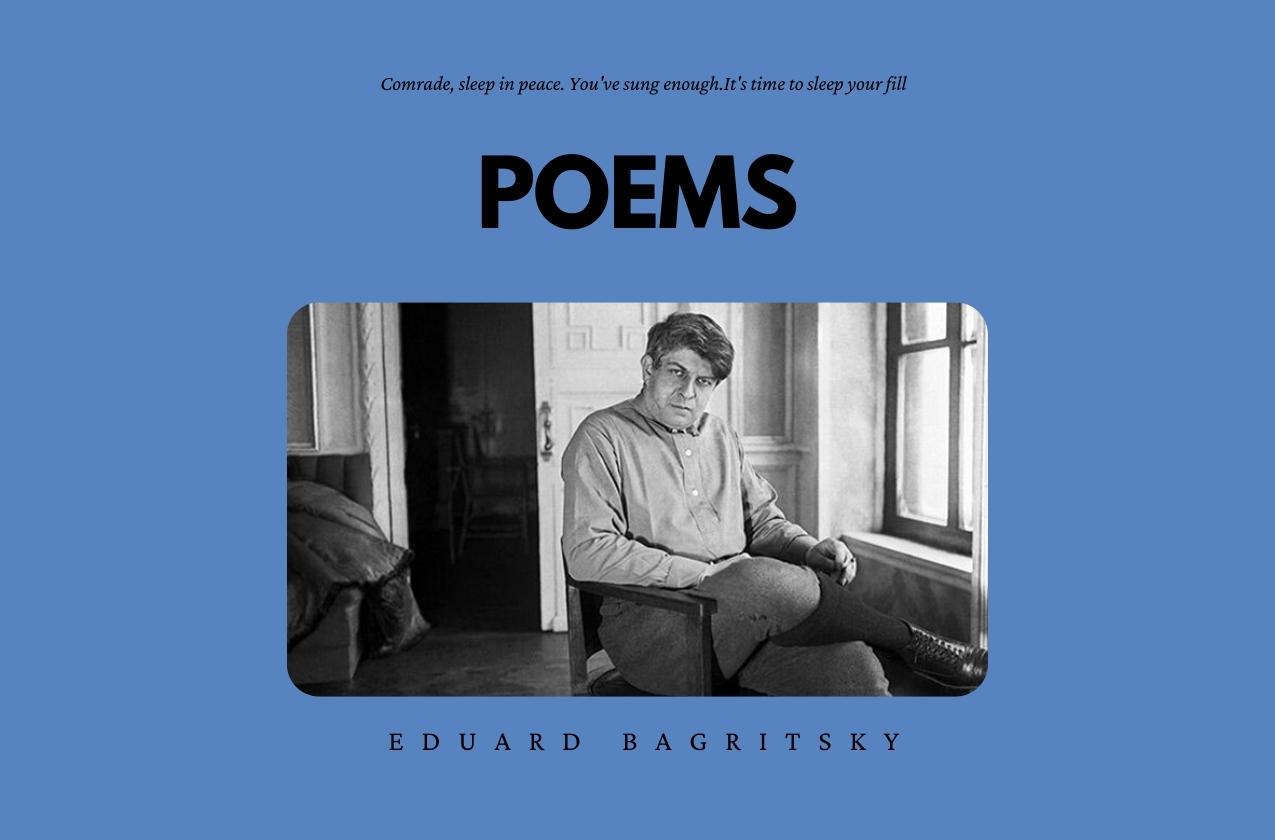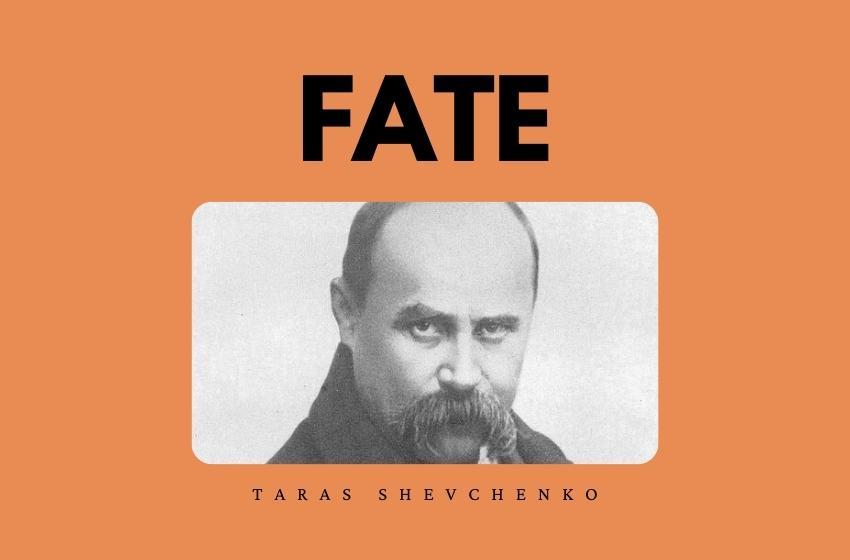Bagritsky, whose real surname was Dzyubin, was born into the family of a poor Jewish shopkeeper. He completed training to become a land surveyor, but he began to write poetry and never worked at that profession. His first poetry was published in various literary almanacs of Odessa. Like his favorite hero, Till Eulenspiegel, Bagritsky was simultaneously a romantic and a man of the real world. The gait of his poetry was also like Eulenspiegel: light, dancing, clastic.
The bird-catcher
A bird-catcher’s job takes practice:
Learn the habits of the birds,
Know the time of their migrations.
Duplicate their different calls.
But as he roams down the roadways,
Spending a night by a fence,
Diedel is happy, Diedel does
Sing his songs and catch his birds.
Nightingales jug-jug their song-pipes
In the moist, round elder bush;
Titmice twitter in a pine tree;
Finches warble in a birch.
Diedel then pulls out precisely
From his precious haversack
Three lures, and to each bird singing
He now dedicates a lure.
He blows on a lure of elder,
And the lure of elder sings.
And within the elder bushes
Soon a nightingale replies.
He blows on a lure of pine wood,
And the lure of pine wood rings.
In the pine a titmouse twitters,
Scattering its tiny bells.
Diedel then pulls out precisely
Front his precious haversack
This, the smallest and most ringing —
The lure whittled out of birch.
He checks all the stops most gently,
Blows into the singing hole,
And beneath his breath the birch wood
Sings out in a high-pitched voice.
And when hearing that voice singing.
That voice of both tree and bird,
From the roadside’s slender birches
A finch warbles his loud song.
On beyond the country byways,
Where the din of carts is mute.
Over a pond thick with duckweed,
Diedel has put out his nets.
Many shades of blue above him.
Green below him, and the world
Is a giant bird before him,
Warbling, trilling, full of sons.
Happy Diedel thus goes walking
With a stick, a bird, a pack...
Through the Harz, the thick-grown forest.
By the green banks of the Rhine...
Through Thuringia with oak trees.
Through Saxonia with pines,
Through Westphalia s elder bushes.
Through Bavaria’s hopbines.
Martha, Martha, should you cry tears
Because Dicdcl walks the fields,
Because your dear Diedel whistles
To the birds — and laughs perchance
1918
Translated by Vladimir Markov and Merrill Sparks
Smugglers
Over fish, under stars,
the little boat races —
three Greeks are aboard,
smuggling goods to Odessa.
Jibing and tacking,
skipping over the waters,
are Yanaki, Stavraki,
and Papa Satyros.
The wind — how it whoops!
How it whistles right past —
sets the nails ringing,
rattles the mast,
and moves with a ripple
neath the hull in the dark:
“Wonderful trade! Excellent work!â€
Let the stars sparkle,
let their light pour
on cognac, and stockings,
and condoms galore…
Aye, the Greek sail!
Aye, the Black Sea!
Aye, the Black Sea!..
Thief upon thief
. . . . . . . . . . . . .
The hour of midnight —
a dangerous time.
Three border patrolmen,
darkness and wind.
Three border patrolmen,
six eyes on watch –
six eyes on watch
and a fast motor launch…
Three border patrolmen!
A thief on the lookout!
Throw down the launch
in the Ottoman sea,
so that the waters
buzz at the stern:
“Wonderful trade!
Excellent work!â€
So that the petrol,
like a bat out of hell,
shoots through the pipes
to the ribs and propeller.
Aye, starry midnight!
Aye, the Black Sea!
Aye, the Black Sea!.
Thief upon thief!
. . . . . . . . . . . . .
How I would love
to sprawl on the deck,
with the breeze in my whiskers,
in the fast-flying dark,
to see all the stars
glimmer over the bowsprit,
to shatter my voice
on the Black Sea’s argot,
to hear through the wind —
so bitter, so cold —
the tongue-twisting prattle
of the sentinel’s motor!
But perhaps it’s more proper
to spy on a thief,
with a gun in my fist,
as he flees through the mist…
To sense the strong wind
as it brushes my veins,
while I follow the sails
of thieves on the run…
Then, all of a sudden,
to meet in the night
a mustachioed Greek
without taking fright…
Aye, pound in my veins,
harder and harder,
my harborless youth,
my fury and ardor!
Let the stars rain
like blood from a wound!
Let me race onward —
a shot past the moon,
Let the waves sound —
a fanatical chorus!
Let my lips curl
round those venomous words —
I’ll sing till I’m hoarse,
so awfully free:
“Aye, the Black Sea,
wonderful sea!..â€
1927
Translated by Boris Dralyuk
Till Eulenspiegel
In a springtime, before noon, the kitchen door
Is open wide and heavy fumes escape.
They shove and push inside.
The cook, all heated up, wipes his face
On an apron full of holes.
Lifting the copper cover,
He peaks into the pots and bowls.
He yawns and throws more coal
Into the stove already blazing.
Topped by a tall cook's cap, the kitchen boy
Struggles up the ladder to reach high shelves
Then pounds some cinnamon and nutmeg
And messes up condiments
And coughs because of smoke
That fill his nostrils and
Makes him cry...
This day in spring is very clear.
The crying of the swallow blends
With the grumbling of pots and pans.
Licking his chops, the purring cat
Sneaks up under the chairs to
Just that spot where a cut of beef,
All covered with a veil of fat,
Had been forgotten.
O, kitchen kingdom! Who has not sung
The bluish smoke that issues from the roasting meat,
The light steam above the golden soup?
The cock, who might be killed tomorrow
By the cook, crows coarsely forth
A merry praise to this so splendid art
Most difficult and pleasure-yielding...
This very day I go along the street,
Staring at the roofs and reading verses.
My eyes are dazzled by the sun,
My drunken no-good head is dizzy.
And breathing in the bluish fumes, I do recall
That vagabond who wandered
Just like me perhaps
Along the street of Antwerp...
Adroit in everything and knowing nothing,
A knight without a sword, a plowman
With no plow, he too was tempted by a ham
And greedily he swallowed his saliva.
His day in spring was sweet and clear.
The breeze with a maternal hand
Had tossed his tangled curls.
And, leaning on a door frame,
That merry pilgrim, just like me perhaps,
Hummed indistinctly while putting words together
For a song not yet invented...
What of it? Let my lot be homeless
And unruly. Let me stand famished
Under kitchen windows, inhaling smells of feasts
Prepared for others.
Let my clothes turn shabby.
Let me unlearn to make up songs...
What of it? 'Tis other things I crave...
Let me, just like that vagabond, traverse
All of the country and warble
By each door and hear at once
The answer of a singing cock!
A singer without a lute, a warrior without a weapon,
I shall greet the days like cups
Brimful of milk and honey.
However, when fatigue will conquer me
And I shall fall into the strongest deadly sleep,
Let them design my gravestone escutcheon!
A heavy staff of ash
Atop a broad-brimmed hat and bird.
And let them write: "Here lies in peace
A merry pilgrim who never cried."
Passerby! Ir you cherish nature,
The wind, the song and freedom, say:
"Comrade, sleep in peace. You've sung enough.
It's time to sleep your fill!"
1918, 1926
Translated by Vera Dunham





















